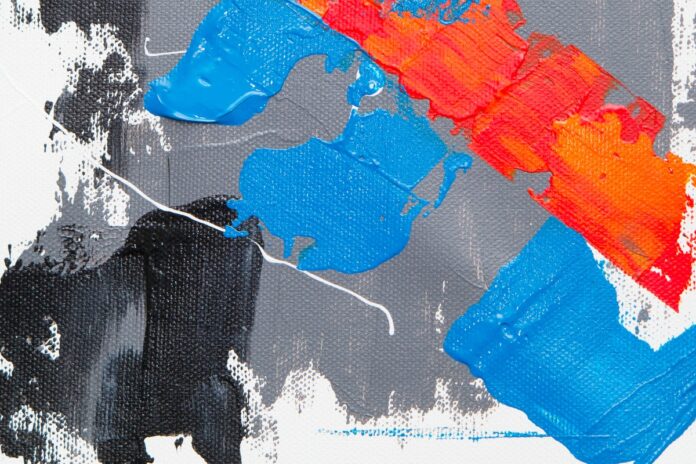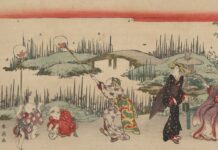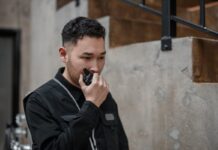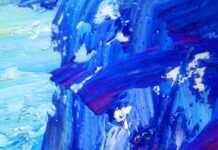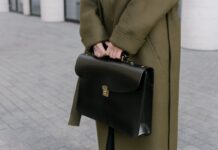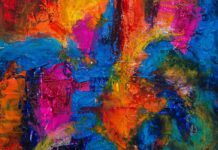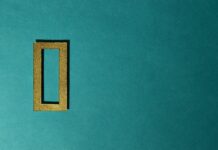X-rays struck Matthew’s tray. A snowy-haired man, with marine-green eyes, attempting impartiality, and glowing like alabaster, asked: “Why Israel?”
A distorted representation of Matthew filled the gilt buttons on the man’s blue jacket. An obese Jewess, chomping on food nearby, had already been interviewed by the man whose buttons distorted Matthew’s face.
“I’m only going to Jerusalem for two days,” Matthew replied. “Then Jordan.”
The man’s hair, eyes and skin made Matthew think: Computer-generated in Israel. Sent to Prague.
“Why not fly straight to Jordan?” Alabaster asked.
“It’s thirty percent cheaper to fly to Israel. And I want to see Jerusalem,” Matthew replied.
“Are you meeting anyone in Jordan?”
Hamas’s military elite, Matthew thought.
“Friends from the States.”
Ones he’d never met.
“Have a good trip.”
“Thanks.”
Matthew avoided raising a stiff, right arm to acknowledge a self-imposed instigator of the law.
*
A newspaper photograph of a man holding a dead three-year-old girl, after an Israeli air raid in Lebanon, boiled the agitation pond bubbling in Matthew’s temples. The girl’s hanging limbs resembled soft rubber. Death to all foreigners sat beside the photograph, concern eddies eroding the shores of Matthew’s mind; recalling the shooting of a female, Israeli human-rights worker by an Israeli soldier, the woman having been beside an open window in her flat in Ramallah, Matthew tingled with trepidation, temples seemingly flickering like strobe lights.
I must be crazy, he thought.
A couple ahead of him held hands and whispered amusing asides in Hebrew. The woman’s eyes shone when her boyfriend whispered, lips beside her left cheek. The security cocoon glowing around them glittered Matthew’s agitation with envy.
They faced familiarity, he interrogation.
The woman’s red shoes matched the red, vertical stripes in her blue dress. Her black hair, paralleling red, decorated her classical form. Her red handbag’s strap’s gilt chain glistened under arrival-lounge fluorescence.
She stroked her boyfriend’s face, painted-red lips touching his mouth, their holiday reinforcing their love. They would be home soon, using abundant water, water restricted at its source fifty kilometres away in Palestine.
A poster covered a wall, millions available to anyone providing information about a computer-generated individual, Matthew amused by the poster’s zeros. That fake Arab was worth millions, terrorism needed for maintaining excuses for stealing.
“Look,” the woman in the red-striped dress said, observing the poster; “can’t terrorists find anything better to do?”
The light showering from the light-brown ceiling heated Matthew’s neck, immigration officers behind a glass-topped wall of off-white.
A woman in a sky-blue uniform faced Matthew. Her officious distance possessed the snowy-haired man’s fake impartiality.
“Where are you going in Israel?” she asked.
Matthew repeated his Jordan story. Her voice exuded pretentious indifference.
“Why not fly straight to Jordan?”
“Thirty percent cheaper to fly to Israel.”
“Are you meeting up with any groups?”
“In Jordan?”
“No. In Israel?”
“No. I’m meeting friends in Jordan.”
“Where are your friends from?”
“New York.”
“Have you been to Israel before?”
“Yes.”
“How many times?”
“This is the second.”
“When was the first?”
“1999.”
She put a slip of paper into his passport and handed the passport back.
As Matthew entered baggage collection, slip in passport, a uniformed woman stopped him and asked: “Where are you going in Israel?”
A gun covered her right hip. Her chubby face made Matthew feel sorry for her ignorance. He repeated his story.
“Are you meeting up with any groups?” she asked.
She was English.
“No,” Matthew replied.
Fighting for Arabs, you’re a criminal. Repressing Palestinians, you’re not.
“Are you going to travel alone?”
“No. I’m meeting friends in Jordan.”
“From where?”
“The States.”
Lacking the immigration officer’s pretentious impartiality, Matthew assumed she was new. Interrogating people, under slabs of painted aluminium, in a light-brown, rectangular room, she was another innocent tool of repression.
Removing the paper from Matthew’s passport, she said: “Have a good trip.”
“Thanks.”
*
Kite-sailors swooped over the beach in Tel Aviv, bodies on towels perpendicular to the shore like carbon polarised by magnetic complacency. Nearby, life seeped through checkpoints, constipated movement irrelevant to the polarised.
Matthew’s hotel receptionist said: “There are Jews out there.”
“Kneeooohhhh,” Matthew replied. “Do the authorities know?”
“People refuse to speak for fear of repercussions.”
The receptionist’s goatee beard, covering his triangular chin, suited his ponytail.
“Something must be done,” Matthew said, “before this problem festers.”
“An extermination company must be contracted immediately,” the receptionist replied.
Wit stopped Matthew’s thinking about what lay ahead.
“We must,” he said, “avoid a plague.”
“I agree; but I fear the problem is already out of hand.”
Matthew laughed while heading for the door.
*
Under limestone in East Jerusalem, he headed towards distant light. Soldiers glared at passers-by. Clashing voices emphasised soldier silence. Blue flak jackets covered the soldiers’ torsos. The laid-back curiosity of an Arab, smoking a hosepipe, faced soldier sneering insularity, the Arab’s face like tree bark, his eyes non-judgemental, the soldiers taught with tension.
Matthew reached the light, thinking: Receptionist wit wouldn’t be appreciated here.
He had sent an email to the NGO asking if everything was fine.
No problem; see you soon……….
It had been the second email he had sent to the NGO in two days. He had been hoping to discover that someone else was going to Nablus from Jerusalem at the same time as him.
Would they care if I disappeared? he wondered.
His temples fizzed in uncertainty’s froth. Everything seemingly shivered with tinsel iridescence. In Jerusalem’s old town, a Palestinian had said: “Nobody’s going to the West Bank now; it’s too dangerous.”
Everything had spun within.
Ultra-violet slashed into his eyes. A woman in black, like a mound of ebony, wobbled passed the soldiers at the Damascus Gate, laced-up, iconic, soldier boots representing oppression. Tomatoes in a shop nearby looked painted with blood.
Someone, Matthew thought, is wrong. But who?
Clashing information resembled the teeming interactions of light that flew reflected from slanting surfaces. He felt the tremors of ignorance that hit those fighting to obtain facts.
He entered the Ramallah bus. It slowly filled. He had never felt such patience. Normally, he wanted public transport to shift quickly.
The bus passed bougainvillea-draped, limestone walls, entering where anything could be constructed mentally and physically to support any cause.
I’m going, he thought, to where legitimate complaints abound, and some aren’t going to be happy with foreigners.
Cranes rose where settlements were scarring stolen land. The separation wall snaked grey beside the road, a tasteless version of the natural-stone barriers the Palestinians had built throughout history. The contrast between Israeli grey and the granite cells placed upon Terra firma by the Palestinians–the cells following the land’s contours and curves–revealed adaption versus unnatural division.
In Ramallah, Matthew hurried towards a yellow minibus. A man wearing a red-and-white headscarf was pushing a green trolley of stacked, golden bananas towards a fruit-and-vegetable market where women in traditional Palestinian dresses, under green, red, white, and blue umbrellas, were selling nature’s colourful products under the city’s main minarets, Matthew hoping this exotic pleasantry would continue all the way to Nablus.
The minibus climbed up and down, passing white, hilltop, Palestinian villages, whose highest points housed green-domed mosques, the villages like natural extensions of the rocky land.
Dread accumulated like mould upon Matthew’s mind as the minibus reached the Hawara checkpoint near Nablus. Women in full-length black stood before golden bananas and shiny-red tomatoes in stalls before an iron tower whose head was divided into four sections by steel walls. Soldiers glared down from the iron head. Their guns’ lasers spotted car drivers queuing to leave Hawara. The drivers felt those crimson spots upon their bodies.
Matthew dashed past the stalls; a chalk path fired up light so intense he squinted. Better anyway, he thought, not to look.
A soldier in the enclosure beside the path stared at Matthew with a curiosity that radiated like the light bouncing up from the chalk. Mathew glimpsed the soldier observing him, soldier eyes’ whites made enamel-like by the leering brilliance of unashamed vigilance. Matthew returned to squinting at chalk.
The cage-like turnstile he entered clicked, each step producing click, click, click, clicking like something snapping.
The young men queued to enter the checkpoint in the other direction stared at Matthew as he fled past them after emerging from the turnstile. The cold, sour looks those men produced, while staring at someone who might have been a spy, fired exploding tension through Matthew’s head, the glaring displeasure of false accusation mirroring the effulgence beaming off the white path. Those men all knew people who had been killed. Some of their relatives had been imprisoned or shot, outsiders potential infiltrators.
Given Israelis saw everyone outside their group as potential enemies, Matthew was caught between both sides’ suspicions, like a dual scapegoat facing trumped-up charges where he didn’t belong.
He raced between parked yellow taxis, avoiding eye contact, yellow making a vivid contrast with women’s ebony coats and the bone-white translucence of headscarves.
He entered a taxi that a passenger had just emerged from.
“Yes. I know place,” the driver said, observing the address Matthew had given him.
The driver’s bulk ironically emphasised his gentle amiability.
A woman in black the taxi passed resembled an ebony ghost as she slid before a marble wall that cast out teeming light, her physical salience at opposite poles to the exposure of her identity. Matthew’s current reluctance made him understanding of this woman’s pursuit of anonymity, hiding identity more necessary in some places than in others. Right then he admired anonymity.
They passed a cemetery whose abundant boughs moved mysteriously in independent directions. Outside the cemetery there was no wind.
“They died all,” the driver said, “with less than twenty-five years.”
Hundreds of headstones. Uncertainty momentarily returned to quiver Matthew’s insides with that troubling ignorance that most people avoid, the taxi reaching the NGO’s offices.
Relief came inside.
*
Every night, Israeli armoured vehicles created shrieking, metal rivers, gunfire’s flat cracking, with booming explosions, echoing off the granite slopes that hemmed the city in.
The metal streams sometimes flowed during the day, descending from hilltop bases to administer death and destruction to people whose families had been evicted from their homes by those metal streams decades before. The young soldiers inside the metal boxes heard granite thumping their vehicles as they headed to where the reception included projectiles that travelled faster than rocks.
“The National Authority,” Peter said, “lets the Israelis pick up their dead soldiers. There’s no shooting when that happens.”
Peter was the first volunteer Matthew had met. They shared a room in the NGO’s flat. A wall covered in paintings of idealised visions of Palestinian life stood beside them as they were waiting outside the Balata Refugee Camp to be shown around. The camp’s wall paintings represented idealised futures based on the past. The creamy towers of an Orthodox Greek church faced the camp. The man who administered the church had survived Israeli incursions. His brother had died when trying to stop a Jewish religious fanatic from damaging the church’s interior.
Peter and Matthew were waiting for Nuri, a Palestinian who worked for the NGO. Better to see Balata with someone familiar with the camp, where twenty thousand people filled a small space, the concrete camp expanding upwards from shaky foundations, reinforced-steel girders protruding from rooftops, so storeys could be added quickly if needed. People plastered up bullet holes left nightly by “Jewish gunmen.”
Matthew saw plastered-up bullet holes on the camp’s walls as they strolled towards the camp’s cemetery. A splatter of Israeli wake-up calls was waiting to be filled by a man on a ladder. Filling those holes, Mathew realised, signified dignity–a message that the Palestinians weren’t leaving.
Nuri’s fine, black hair was flicked back from his forehead. His watery eyes twinkled when he spoke. The difference in living standards between the camps’ inhabitants and those living in the houses high up on the slopes was epitomised by what Fatima, an American Palestinian, whom Mathew was teaching English, said when he told her he was going to Balata: “I wouldn’t go anywhere near that place.”
Concrete tombs sat between trees on sloping ground in the camp’s cemetery of martyrs.
“The average age of the people in this cemetery,” Nuri said, “is twenty-two.”
His voice was soft and distant. His eyes glittered. He fought to keep things in. He often spoke wondrously of the Palestinian poet Mahmoud Darwish whose verse almost won the recently deceased writer the Nobel Prize for Literature.
Men were sitting on chairs in an entry area. The entry arch’s walls were covered with posters commemorating martyrs. The posters displayed Jerusalem’s golden dome. Seeing that dome would mean freedom, normalcy, a life, the sensation of existing.
“Can we go in?” Matthew asked.
Nuri asked the seated men. They shook their heads.
“You need permission from the families,” Nuri said.
“Okay, thanks,” Matthew replied.
They stood outside, the graves covered with photographs and flowers. A slight wind gave the trees a voice that wailed like a spirit seeking resolution, rippling boughs shifting shadows and mottled light over the final resting places of men who had resisted US-backed robbery, changing light swaying over a place that symbolised that resistance against injustice is eternal.
*
Matthew entered the shaded maze of Nablus’s old heart. Clashing voices created an incomprehensible mix of bird-like chirping, the streets only wide enough for two single files of people to move in opposite directions past each other, the files passing shoes, kitchen utensils, brooms, umbrellas, fruit and vegetables; caged chickens shrieked as sharp-eyed cats stared at the poultry, the cats often flashing into dark alleyways that branched off from the main thoroughfares, the alleyways where armed men waited for the invader, frozen felines facing freaked fowls, wings flapping, white feathers falling, chicken smell like death.
Martyrs’ posters covered the old town’s walls. The breeze channelled down the alleyways fluttered loosely hanging posters. A poster got turned around by the breeze, the poster’s white back facing the street. People flooded past the posters that often quivered and swayed, hanging on against indifference, deteriorating like waning hopes, waiting to be plastered over by new dreams. You could hear traffic rumbling outside the old town and posters scraping against walls in the wind. You could see freaked fowls fluttering before felines and men in black, holding AK-47’s, at the intersections of alleyways, the men staring suspiciously.
Apprehension’s fizzing bubbled in Matthew’s temples as four men in black glared at him accusingly, like cats glaring, white feathers falling from flapping chickens.
Matthew dashed up some stone stairs into where a domed roof was encrusted with coloured glass. Four men in black were at a table near a fountain that occupied the middle of the floor. The water surrounding the fountain was coloured by the light that fell through the coloured glass. Flowing water gave the place the tranquillity it deserved.
Shock hollowed Mathew’s interior. The pastry the men were eating was stuffed with vegetables. They offered him a slice. He sat with them at their table. One had fingers missing on his left hand. Another had a lightning-bolt scar running up his right arm.
Industrial accidents, Matthew thought.
The men were wearing black T-shirts. Their AK-47’s’ straps, hanging over the table’s edge, were shaped like teardrops. They had short hair, were clean-shaven, modern men in a modern conflict.
“Where are you from?” the leader asked.
“Australia.”
“Nice.”
The leader’s tone sat between politeness and accusation. The others stared at the mysterious visitor.
“Are you working here?” the leader asked.
“I’m teaching English here,” Matthew replied.
“Oh,” the leader said.
One of the others said something in Arabic and the others laughed.
“Nice food,” Matthew said. “I should come here more often.”
“I’m glad you like it,” the leader said.
“I do,” Matthew replied. “Compliments to the chef.”
“How long are you going to be here?” the leader asked.
“Six weeks.”
“Nice.”
“Thank you.”
The four men smiled at each other. The manager was at a table by himself, bent over a newspaper, refusing to look.
Must be a fascinating newspaper, Matthew thought, staining dread spreading across his brain as he realised that a missile could penetrate the roof at any time. He was like a pip squeezed out by opposing factions that may have been spat out in any direction at any moment.
“Enjoy your stay,” the leader said, slinging his gun over his right shoulder.
The fighters reached the door. Lightning-Bolt Scar hissed: “Good byeeeeeeeee……….”
The others smiled. Matthew hoped they hadn’t poisoned the food.
Straight after the fighters left, Carl and Abe, the two people Matthew had been waiting for, arrived, Abe saying: “We met some friends of yours at the door.”
“One of them,” Matthew replied, “said good byeeeeeeeeee…….”
He grimaced, while hissing: “Good byeeeeeeee……”
“Really?” Carl said, “wow……”
“And if they’ve poisoned the food they gave me,” Matthew said, “it really will be good byeeeeeeee………”
“Don’t think about it,” Carl said.
*
Matthew had only been in Nablus for four days; but it felt like months. An era seemed to have passed since Tel Aviv, information so packed that time attained childhood dimensions.
Entering the NGO’s computer room to check his emails, he saw Hakim, the NGO’s chief administrator.
Hakim’s face had puffy cheeks, his skin pale for an Arab. His small, brown eyes exuded a sincerity that was usually strong enough to dilute his arrogance. His was convinced all Israelis had full knowledge of the occupation.
“Most Israelis are ignorant,” Matthew was later to tell him. “They’re kept that way by the world’s most effective propaganda machine. They even believe they’re living in a democracy.”
“Hi,” Hakim said.
“Hi,” Matthew replied.
“Things fine?” Hakim asked.
“Yes,” Matthew replied.
“How are the classes?” Hakim asked.
“Fun,” Matthew replied.
“Good,” Hakim said.
Hakim’s underlying arrogance disappeared as he titled his head with perplexed curiosity and said: “Michael said that Nablus is safe….”
His lingering words quivered the inquiring silence. Matthew’s interview with Hamas had occurred that morning.
“Tell him,” Matthew replied, “to visit Balata at midnight.”
Hakim’s silent smile resembled sunlight illuminating a forest. He had been referring to Matthew’s worried emails. The disappearing arrogance left a surprising base of innocence.
“So no problem now?” he asked.
“No,” Matthew replied.
*
Michael had been in the flat when Matthew had arrived from Jerusalem. Another Israeli invasion of Lebanon had begun five days before, hence Death To All Foreigners.
Matthew had arrived with Hakim. Carl had been on a sofa, reading a book. Carl’s warm eyes had glittered when shaking Matthew’s hand, his grace emphasising Michael’s gloomy sourness, Michael’s dark eyes like bitter, black holes.
“Any problems getting in?” Carl had asked.
“I told them I was going to Jordan,” Matthew had replied. “I will some time anyway.”
Michael offered a limp hand during the introductions. Peter was in the room where Matthew left his things. He and Matthew went to a café later. The others had gone off to see a demonstration. Matthew hadn’t been invited.
Peter’s open seriousness of sincere, gregarious curiosity put Matthew at ease. They went to a café in Nablus’s old town and talked about the occupation. After Peter left Nablus three days later, Matthew discovered that Peter had spent his nights writing a book, avoiding the other volunteers. Peter had also been visited regularly by a pretty volunteer called Sylvia who was staying in another house.
“Peter was unsociable,” Abe said.
He was much more sociable than that prick Michael, Matthew thought.
*
Below the café that Peter and Matthew went to, street vendors, behind painted trolleys, sold drinks and food. The trolleys’ flat-topped, box-like bottoms sat below timber ceilings from which hung paper glasses and plastic bags, the bags containing paper plates. Yellow taxis mingled with trolleys and women’s glass-dotted headscarves, the scarves, splitting ultra-violet into starry green, red, purple, blue, burgundy, turquoise and gold, moving in various directions within the bustle below.
A round, timber table separated Peter and Matthew beside an open window above the trolleys, coloured glass below moving above black asphalt, people minding their own business as the Palestinians had always done, despite “Darwish’s locusts showing up uninvited in swarming clouds, believing they were the law.”
Matthew’s comment about locusts caused Peter’s bright, furry-animal eyes to glow like a possum’s in moonlight.
“Talking about locusts,” Peter said, “Sylvia and I were once going through Hawara to head for the coast. We saw an American called Rachel who had worked for our NGO. She was wearing an Israeli army uniform, checking ID’s in the women’s queue.”
“Oh, dear,” Matthew said. “Do you think there are others?”
“Undoubtedly.”
“Fantastic, hey?” Matthew asked. “Joining the Israeli army and killing innocent people where they were born makes you a professional soldier. Fight for Arabs, who are attempting to kick out foreign troops, and you’re a criminal.”
“The media is creative,” Peter said, smiling.
*
Michael’s arms were tied behind his back, his eyes covered by a blindfold. The stairs they pushed him down curved while descending. They shoved him into a windowless room and then onto a bed. A hand grabbed the back of his head and pulled him up so that his hands rose. They untied the ropes. They grabbed his ankles and lifted them up so that he ended up on his back on the bed. A gun barrel sat against his forehead. They tied his hands and ankles to the bed. Every action his captors undertook bolted fear through Michael’s head as he lay unmoving on the bed.
The leader removed the blindfold and asked: “Why have you been here so long?”
“I’m doing a research project in an American university,” Michael replied.
His arrogance had been so crushed by uncertainty that he now felt like a different person.
“Ohhhh,” the leader said, “a research project, eh? We’re doing research too.”
Lightning-Bolt Scar grinned malevolently. Sweat mountains dominated the plain of Michael’s forehead.
“Gentlemen,” the leader said, “perhaps he’s planning terrorist activities?”
Michael faced accusatory stares. Despite fierce light illuminating the room, the men’s eyes looked black. The stamps in Michael’s passport sharpened their curiosity to a bitter edge.
“Three visa extensions,” the leader remarked, tapping the passport against his left palm. “Very unusual.”
“I’ve got a friend—“
“Of course you’ve got a friend; a friend with fascinating contacts.”
Michael squinted. The sweat burning his eyes resembled the poison that sensory information had become. Curiosity produces sweat’s full range. Now there wasn’t any future or past, just a present in a room of horrible light, the walls looking concave with concern.
“A friend,” the leader said, grinning. “He really must be some friend.”
It wasn’t easy getting visa extensions.
Michael naturally had a face that looked pained; so it seemed as if that face had found its appropriate place, like an entity returning to the source of initial anguish, feeding that anguish whose condition had the comfort of normalcy, the walls shivering before flames of crepitating worry as if moving.
“A friend,” the leader repeated. “How sweet.”
In normal circumstances, the leader would have been an ambassador or a professor of sociology or history; but probity had turned him into a media event called a “terrorist.”
His forehead was smooth. His black eyebrows, with a feminine grace, swirled above his deeply set eyes, like written Arabic.
“Most of my friends,” he said, “are dead.”
“Dead” got hissed out like hot water bursting through a crack in a pipe.
“Dead,” he repeated, “because they wanted a country. Do you know what it is like to live without a country? Do you?”
The perennially sour look on Michael’s face hadn’t helped how these men had perceived Michael’s motivations. And they loved things that appeased their indignation.
“Well!?” the leader yelped.
“This is the reason why we’re here,” Michael said.
“Who’s we?”
“The volunteers.”
“Some of the volunteers aren’t volunteers.”
Michael knew about Rachel. He had appreciated her charming vigour. Her blue eyes had glistened with sincerity. She had even expressed her shame about being Jewish.
“Some people are great actors,” Michael said. “I’m not.”
“Beautiful,” the leader replied, “but how can someone get so many visa extensions when they don’t let people into Israel who say they’re going to the West Bank? We’ve got a problem here, haven’t we?”
“We” got hissed out like “dead.”
The shapes swirling in Michael’s perception shivered a touch more on hearing “we.” Chemicals his body had never produced before swirled from his brain down his legs and then back up again before exploding inside his head. The walls now seemed closer, the present, closing in with the walls, shrinking into a hammering series of nanoseconds, life now measured in miniscule units of time.
“Every night they come looking for us,” the leader said. “And why? Because we won’t shut up and be slaves as they steal our land; because we won’t lie down and let our world get smaller and smaller before our eyes without a fight. What would you do in those circumstances?”
He tapped a gun barrel against Michael’s nose.
“Fight,” Michael said.
*
Abe’s gait oozed friendliness. His arms flew up and swung down, his head held high. He was swinging those arms while stepping under an arch that rose over a road that entered the old town, the road lined with limestone walls that funnelled him towards the bustle where light dimmed at the street’s end. He stopped to buy fruit at the bustle’s beginning. A slither of light, coming through a crack in the tarpaulin that covered the street, edged a pile of tomatoes with gold. Here and there, light slithers, coming through cracks, threw ultra-violet into darkness. Without the slithers darkness would have reigned. Without the tarpaulin’s cracks the darkness would have been intense.
The seller indicated that Abe come closer.
“Hamas arrested one of your volunteers,” the seller whispered.
The seller’s bushy moustache resembled snow against brown earth. His open shirt revealed a darker forest on his chest.
“Michael,” Abe replied.
Michael had gone missing. The slither placed effulgence across Abe’s hair. The combination of gold and grey suggested hope had been inlaid into something slowly withering with age.
The seller indicated towards the baths where the stained-glass roof left radiant pellets of light across the fountain’s whispering waters.
“Thanks,” Abe said.
In the baths, the manager was reading a newspaper at a table on a level above the fountain’s circular base. The images carved into the foot-high fountain base reflected the beauty and tranquillity of a past being mauled by Darwish’s locusts. Locusts have extraordinary jaws that can destroy hard objects, destroying with impunity, leaving behind shattered remnants of history, the baths one of those remnants that had survived the chewing; its time would probably come.
“Tell them,” Abe said, “to avoid doing anything silly.”
“I will; but what should I tell them? That he’s not a spy?”
“Even if he is,” Abe said, “it’s much better to keep him alive so that he can see the reality.”
“And he hasn’t already seen it?”
“He’ll see it more clearly now.”
Abe’s family had been removed from their house in Tulkarem in the West Bank in 1967 when the Israelis grabbed Palestine. He had lived for thirty-nine years in the US.
“Tell them our organisation will deal with it, okay?” he asked.
“Okay.”
Maybe that’s why Peter had been so “unsociable,” Abe thought. Learning never stops.
*
The room’s blackness meant Michael was blind. He thought: “I was blind.”
The blackness epitomised compacted coal.
His knee joints ached from immobility. Closing his eyes intensified the blackness, emphasising his loneliness in that ebony uncertainty. He would have loved to have seen people who previously had stimulated no curiosity in him whatsoever. He lay immobilised between now and then.
Believing Nablus had been safe had come from his blindness, arrogance having affected his retinas. He had wandered around in a dream.
Now, in a different way, he had no idea where he was; but he knew he was underground. He wondered if a missile could strike down to where he was.
He heard keys rattling. The unknown shot electricity across his mind. His head pounded with pain. Stairway light swept the coal dust away. Silhouettes entered. He squeezed his teeth together. Chemicals, shining like fluorescent, deep-sea creatures in his imagination, swirled down from his head’s pain centre to his feet, then back up again.
The room’s light came on. The silhouettes became men in black T-shirts with shaven faces and perfectly cut hair, nothing religious about these men who looked like people you see anywhere in Europe.
Michael knew that gunfire wouldn’t attract attention. Gunfire was as predominant in Nablus as traffic. One night he saw men in a car, driving around, firing machineguns at the hilltop locusts; the men, who had been celebrating a wedding, were killing two birds with one stone.
Gunfire in Nablus was the equivalent of fireworks or cars back-firing in other places. It hardly aroused attention. People continued reading newspapers or playing cards in cafés while others were dying down the street. Gunfire being directed at someone else was someone else’s problem.
Ignorance, when knowledge is desirable, enables the brain to undertake wild inventing. Ignorance creates pleasant worlds that make life easier to live. Michael had been suffering from an illusion of consciousness.
“Up we get,” the leader said, untying the ropes.
Michael’s numb limbs made movement difficult. He flexed his toes and fingers, sitting up, clenching, and unclenching his fists while rotating his feet.
The leader covered Michael’s eyes with a blindfold.
“We’re going for a ride,” the leader said.
“Where?” Michael asked.
Michael craved for any information that could make him believe a future existed.
“You’ll find out soon enough,” the leader replied.
The leader may have been a company director or an international lawyer defending the underprivileged in other circumstances. However, when you’re born in a refugee camp and your parents as children had to flee from an invading army that had massacred thousands, an army that now enters the camps nightly to kill people, smashing their way into people’s homes, letting off sound bombs to wake people up, night after night, while calling itself a victim as it impedes movement between towns, movement slow and unpredictable or impossible in some cases, what can be expected?
The understandable reactions gave the invaders the excuses they needed to tell a press that they controlled that they faced “terrorists,” this magnified by general illusions of consciousness.
The leader, unconvinced of Michael’s innocence, said: “We’re lucky we can put the light on. Your good friends on the other side of that separation wall–a charming construction that shows horror of aesthetics–adore randomly cutting the electricity off, just like the water. No doubt you know they love destroying electricity generators donated by the EU. What charm! They obviously love destruction. Isn’t amazing how the rest of the world are racists and they’re not?”
Michael, still recovering from “your good friends”, said: “Most of them are racists all right. They’re taught to be from birth.”
Fear had left him. A philosophical necessity to accept death as the curer of all ills enveloped him in a sheath of resignation. He was having a new experience: humility.
“They did after all write the Bible,” he said.
“True,” the leader said. “Facts disturb them, for sure.”
When they pulled Michael off the bed, he wasn’t sure if he was going to be executed or released. Illusory consciousness had been replaced with hard thought. The uncertainty of his situation inspired a deeper connection with humanity. He wondered if his previous arrogance had come from mental laziness or from cultural factors. He now admired Abe for Abe’s carefree openness to all, the product of Arab hospitality.
They bundled him head down into a car. They drove around and around, then stopped. Michael couldn’t hear anything. The silence, having no regard for ethics or metaphysics, roared with indisputable impartiality.
Michael assumed he was out in the country, the perfect place to be shot. His fingers trembled. He clenched his fists to fight the trembling.
They opened the door and dragged him out. When they took off the blindfold, his mind seemed to leap out his skull and fly around like a kite as Abe said: “Come on, son, get into this taxi. It’s over.”
*
The felicitous disbelief that had enveloped Michael in a sheath of alleviating splendour had waned sufficiently for embarrassment to dampen his relief. He was with Matthew, Abe and Carl in the flat that sat on one of the slopes that hemmed the city in. The road, cutting through the valley beneath them, was blocked by checkpoints at both ends, the tributaries rising off that asphalt river blocked by Israeli hilltop bases that lurked amid trees where sound bombs were exploded each twilight to remind the Palestinians of what they already knew: that the locusts would continue their mauling.
The room’s spaciousness didn’t reflect the claustrophobic pressure that accumulates with time where movement is restricted by young soldiers who believe their elders, the elders enforcing the blockade for fear that peace could lead to justified punishment, lies therefore passed on.
A big window cast illumination over the room.
“So,” Matthew asked, eyebrows cocked sardonically, “was Hamas curious about visa extensions? It must be difficult getting extensions when they turn people back if they think you’re going to the West Bank?”
“Come on,” Abe said.
“There’s a reason for this,” Matthew said.
“Well?” he asked.
Michael was silent, his distance touched with a sourness that stopped others from warming to him. He was now dreading his comment to Hakim about Nablus being safe, a comment referring to Matthew’s emails to Hakim, Matthew going to make him pay.
Peter hadn’t trusted Michael; hence Peter had spent his time in the flat in his room writing or with Sylvia, avoiding someone who was “suspiciously cold.”
“It’s amazing, isn’t it?” Matthew continued, “that most people would get kicked out for having worked for a Palestinian NGO in the Occupied Terror Tories……You must have some special friends?”
Carl straightened up on the sofa. The silence between the sounds of voices thickened with each wad of soundlessness. Carl stared at Michael.
“It helps to have special friends,” Michael said.
“No doubt,” Matthew replied. “So special that the rules are different for you.”
Matthew’s biceps rippled under his T-shirts’ sleeves; he didn’t mind fighting.
He shattered the thickening quietude with: “I couldn’t care less if you’re working for the Israelis or not. If you are, Abe here can call you Mike the Kike; in my case, I prefer Mick the Prick, because I’d prefer it if you were just a serious volunteer with serious connections; you know why?”
“No doubt you’re going to let us all know,” Michael said.
“Not wrong, Micky,” Matthew said. “But before Mat the Brat here enlightens everyone, he would like to ask Mick the Prick a little question.”
“And what might that be?” Michael inquired.
“Is Nablus safe?”
The question confused Carl and Abe.
“Possibly,” Michael replied, “one should reassess.”
“Possibly,” Matthew replied, “I could assist your reassessment.”
“How?”
“Any place,” Matthew said, “where freedom is crushed under a limit that any sane person would say was unjust is, by definition, dangerous; waiting to explode. Maybe arrogant stupidity hampers knowledge? You got that?”
“I have.”
“Good, Micky. Now tell your friends on the other side of that wall all about it.”
About the Author
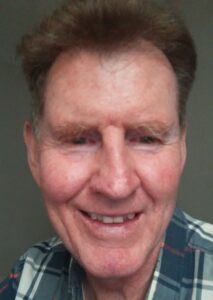
Kim Farleigh has worked for NGOs in Greece, Kosovo, Iraq, Palestine, and Macedonia. He likes painting, art, bullfighting, photography, and architecture, which might explain why this Australian lives in Madrid. 183 of his stories have been accepted by 107 different magazines.


